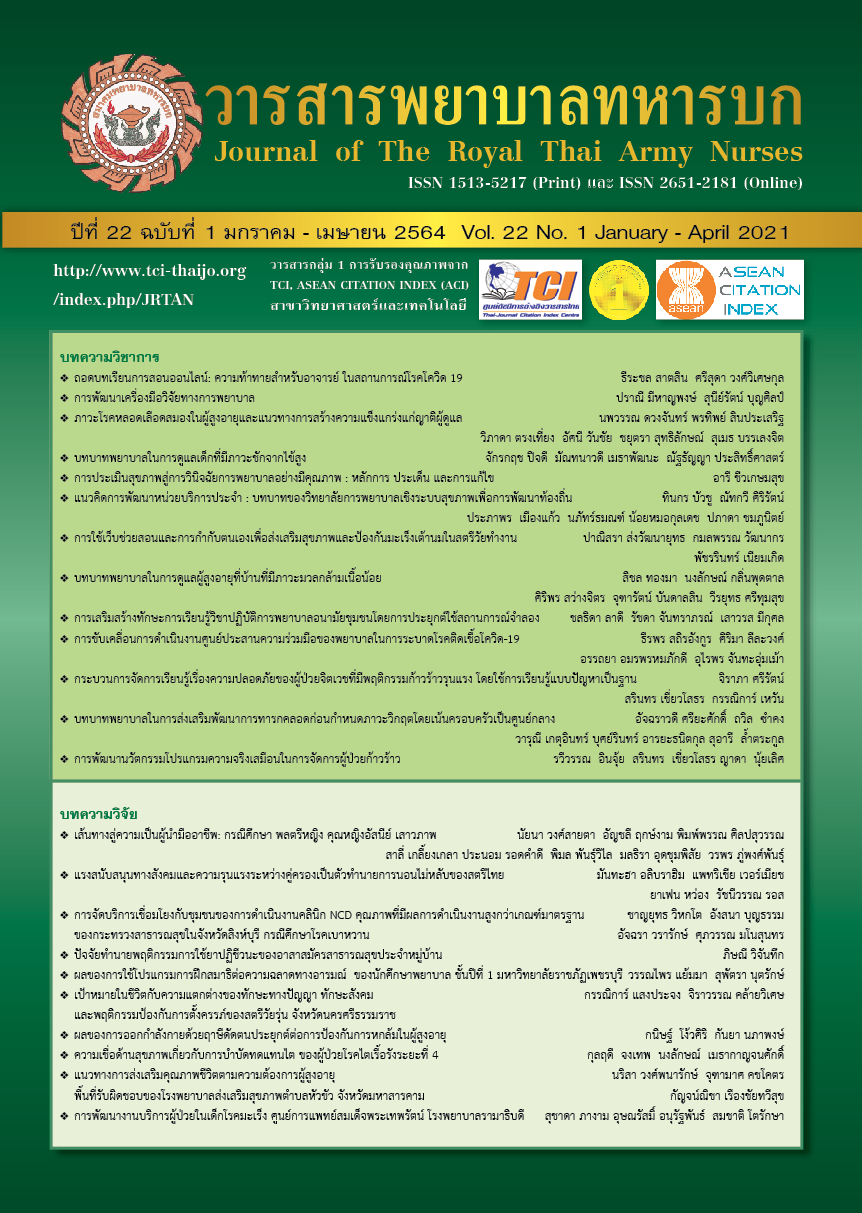Enhancing Learning Skills for Community Health Nursing Practicum by Applying Simulation
Keywords:
Simulation, Nursing education, Learning model, Community health nursing practicumAbstract
Nursing education currently has been emphasizing nursing skill practice in Learning Resources Center following the regulation from Nursing Council, including the community health nursing practicum subject. Regarding course learning outcomes, students are aimed to have the capacity to assess health conditions and basic needs of patients, plan nursing care related to an assessment for solving health problems or promoting health in both individual and family levels is required, accordingly. Moreover, provide nursing care for clients with safety and concern of rights is equally important. Thus, in order to prepare readiness for students before practicing in the genuine situation, applying simulated classrooms will encourage students to participate and increase nursing skills based on situations that similar to the actual contexts. This will result in not only confidence and also critical problem-solving thinking which leads to an appropriate clinical decision. Therefore, this article intended to be a guideline for nursing education particularly in community health nursing practicum subjects by applying simulation to increase effective learning skills.
Downloads
References
Suwannakeeree W, Jullmusi O, Tangkawanich, T. Simulation-Based Learning Management for Nursing Students. Journal of Nursing Science Chulalongkorn University. 2016; 28(2): 1-14. (in Thai).
Leelakraiwan C, Sayawat T, Duangbubpha S, Saedkong P, Pitschart N. Innovation in Nursing Education: Simulation. Journal of Nursing and Health Care. 2019;32(4):6-11. (in Thai).
Eyikara, E. and Baykara, G., Z. The importance of simulation in nursing education. World Journal on Educational Technology: Current Issues. 2017;9(1):02-07.
Thamnamsin K, Punyapet K, Noitung S, Artsanthia J. The Effect of Teaching Simulation-Based Learning Program to The Knowledge in Basic Medical Care of Nursing students. J Royal Thai Army Nurses. 2021;190:80-8. (in Thai)
Sihawong S, Phongdee N, Yanarom N, Noinang N, Anai N, Boonchern T, et al. Factors Causing to Stress of Nursing Students, Ubon Ratchathani University. HCU journal 2018; 21(42):93-106. (in Thai).
Sinthuchai S, Ubolwan K.Fidelity Simulation Based Learning: Implementation to Learning and Teaching Management.J Royal Thai Army Nurses. 2021;18(1):29-38. (in Thai).
Thatan S, Srijanpal W. Teaching Method Using Simulation-Based Learning. Journal of the Nursing Association of Thailand Northern branch. 2017; 23(1):1-10. (in Thai).
Zarifsanaiey N, Amini M, Saadat F. A comparison of educational strategies for the acquisition of nursing student’s performance and critical thinking: simulation-based training vs. integrated training (simulation and critical thinking strategies). BMC Medical Education. 2016;16(1):294.
Lee N, Peacock A. Using simulation to teach undergraduate nursing and midwifery students research design. Nurse Education Practice. 2020;45:102804.
Lertbunnaphong T. Simulation Based Medical Education. Siriraj Med Bull. 2021; 8(1):39-6. (in Thai).
Kim, J., Park, J. H., & Shin, S. Effectiveness of simulation-based nursing education depending on fidelity: a meta-analysis. BMC medical education. 2016;16(1):152.
Norkaeo, D. Simulation based learning for nursing education. Journal of Boromarajonani College of Nursing, Bangkok. 2015;31(3);112-122.
Sezer H, Orgun F. Effectiveness of standardized patient on patient education skills of nursing students - a pilot study. Journal of Pakistan Medical Association. 2019;69(12):1848-1854.
Laureen M. Donovan, Lauren K. Mullen. Expanding nursing simulation programs with a standardized patient protocol on therapeutic communication. Nurse Education in Practice. 2019;38:126-131.
Bloom, B. S. The Cognitive Domain; Taxonomy of Educational Objectives, Handbook I. New York: David McKay Co Inc.; 1956.
Downloads
Published
How to Cite
Issue
Section
License
บทความหรือข้อคิดเห็นใดใดที่ปรากฏในวารสารพยาบาลทหารบกเป็นวรรณกรรมของผู้เขียน ซึ่งบรรณาธิการหรือสมาคมพยาบาลทหารบก ไม่จำเป็นต้องเห็นด้วย
บทความที่ได้รับการตีพิมพ์เป็นลิขสิทธิ์ของวารสารพยาบาลทหารบก
The ideas and opinions expressed in the Journal of The Royal Thai Army Nurses are those of the authors and not necessarily those
of the editor or Royal Thai Army Nurses Association.






